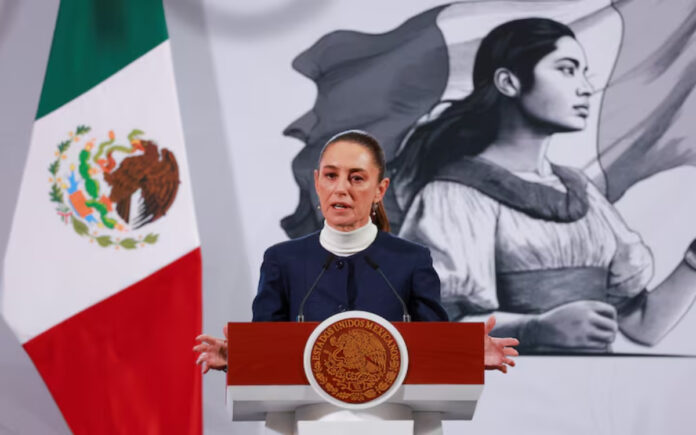Mexico City: Mexican President Claudia Sheinbaum has earned early commendation for her diplomatic approach in securing a temporary reprieve from U.S. President Donald Trump’s threatened tariffs, which could have had severe repercussions for Mexico’s economy.
By reaching an agreement with Trump to pause the tariffs for a month, Sheinbaum has demonstrated a measured and strategic approach on the world stage. Under the deal, Mexico will deploy 10,000 troops to its borders to curb the flow of drugs and migrants, a move that some analysts say helped diffuse the immediate economic threat.
“President Sheinbaum played it well. Masterfully,” said Jorge Guajardo, a former Mexican ambassador to China and a member of an opposition party. He noted on social media that other world leaders would look to Sheinbaum’s approach as an example.
Lila Abed, director of the Mexico Institute at the Wilson Center in Washington, also highlighted Sheinbaum’s diplomatic strategy. “Sheinbaum has taken a very cautious and strategic approach to the Trump administration,” Abed said, pointing to Mexico’s recent surge in fentanyl seizures, including its largest bust in December.
“She’s been taking actions within her government to send a clear signal to the United States that it understands that fentanyl and organized crime are a top priority for the Trump administration,” Abed added.
Canada’s Prime Minister Justin Trudeau also secured a 30-day pause on U.S. tariffs after announcing a list of targeted retaliatory tariffs, contrasting with Sheinbaum’s more measured response.
Abed described Monday’s pause as a “temporary win” for Sheinbaum, noting that its long-term success hinges on her ability to deliver immediate results on migration and security.
Strategic Response Amid Economic Uncertainty
The 25% tariffs, initially threatened by Trump in November to pressure Mexico and Canada into addressing fentanyl trafficking and illegal immigration, presented one of Sheinbaum’s first major foreign policy tests. As Mexico’s first woman president, she has vowed to maintain a “cool head” in tariff negotiations.
“Sheinbaum, upon the announcement of the tariffs, kept a very measured tone,” said Mexican political scientist Denise Dresser in a live discussion hosted by the Center for Strategic and International Studies.
“We were bracing for impact,” Dresser added, emphasizing that Mexico remains vulnerable and could face significant economic setbacks if tariffs proceed.
Despite these challenges, Sheinbaum’s handling of the crisis has not dented her popularity. A poll by Buendía & Márquez recorded a three-point increase in her approval rating from November to January, reaching 77%.
Her ability to defend the North American trade agreement—despite once opposing it as a student activist—has reassured critics who feared she might struggle in negotiations with Trump. Her predecessor, Andrés Manuel López Obrador, managed to build an unexpected working relationship with Trump during his tenure, and some had questioned whether Sheinbaum could do the same.
Also Read | Trump Administration Moves to Curb Antisemitism in Higher Education
On Saturday, Sheinbaum announced that Mexico would impose retaliatory tariffs on U.S. goods if Trump’s broader tariff order on Mexico, Canada, and China were implemented. However, she did not provide specifics.
Dresser noted that Sheinbaum’s decision to “keep her options open” had worked to her advantage.
Strengthening Domestic and Global Standing
Sheinbaum’s firm stance on Mexican sovereignty and economic resilience in the face of U.S. pressure has resonated with her electoral base, the private sector, and even some members of the opposition, according to Abed.
“She has been successful in her negotiation strategy. Her being cautious but at the same time strategic and proactive, in terms of trying to derail tariffs, is something that has been really welcome within Mexico,” Abed said.
Also Read | El Salvador to Detain US-Deported Gang Members in ‘Mega-Prison’
With a temporary pause in place, Sheinbaum now faces the challenge of delivering tangible results on border security and drug enforcement to prevent further escalation.



